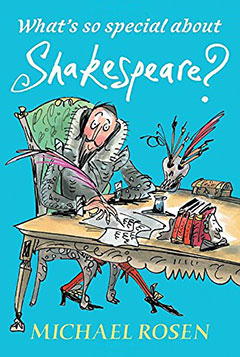 We celebrate William Shakespeare’s birthday on April 23rd (or thereabouts). Consider reading excerpts of this book to your classes.
We celebrate William Shakespeare’s birthday on April 23rd (or thereabouts). Consider reading excerpts of this book to your classes.
In What’s So Special about Shakespeare?, the author, Michael Rosen, walks into a house with us, peeking into rooms where Shakespeare’s plays are being enacted. Such variety! It’s an inspired way to place young readers among the people of Shakespeare’s time.
Here’s a striking statement: “All this may sound extraordinary, but Shakespeare lived in extraordinary and dangerous times.”
Rosen shows us those dangers, the propensity for war over land, money, and power, and the very real threat of having one’s head chopped off.
Religion and politics were all mixed up in Shakespeare’s day, in England and on the Continent. It was easy to be found guilty of treason, to lose your life. Rosen’s lively text helps us understand that when Shakespeare wrote his plays, there was political and religious commentary woven into through his dialogue. He placed himself in danger.
“It’s interesting to wonder what effect this might have had on audiences in Shakespeare’s time. After all, when the play was written [Macbeth], many people still thought that kings and queens were almost like gods. What happens if they’re also criminals?”
What was school like for Shakespeare? How did ordinary people live? Why did they go to the theater? What do we know about Shakespeare’s life? (Not much.)
Placing Shakespeare within his world, explaining that world, we see that printed books were relatively new, and people who knew how to read … that was fairly new as well. Shakespeare was well read. He was often inspired by other texts, sometimes borrowing the ideas and the story. Rosen shows us a comparison between a Plutarch passage and Shakespeare’s Antony and Cleopatra. It is evident that Shakespeare’s version is more interesting. He was a very good writer who knew how to hold an audience.
“Then you’ll see that Shakespeare didn’t really write books, he wrote scripts — scenes and speeches for people to say out loud and act out in front of other people.”
There are in-depth explanations of four plays: Midsummer Night’s Dream, Macbeth, King Lear, and The Tempest. In-depth? Four to six heavily illustrated pages are devoted to each play. This is readable!
Sarah Nayler’s drawings are downright funny, often reiterating the text but underlining it with broad and rambunctious humor.
The type is big with a good deal of space between the lines, making this quite easy to read. And those drawings! They break up the text.
A previous version of this book, Shakespeare: His Work & His World, written by Michael Rosen, was published by Candlewick in 2006. That volume was intended for ages 12 and up. What’s So Special About Shakespeare? sees a change in book design and it’s appropriate for younger readers. The trim size is just right for tucking into a backpack. A Shakespeare timeline and bibliography are appreciated.
Do you have students who love the theater, acting, plays? This books tells the history of theater in a much shorter fashion than the semesters I sat through in college! For students who are reluctant to study Shakespeare, this book will enliven their curiosity about his plays. Highly recommended.
Here’s an effective booktalk for this book by the author himself!
What’s So Special about Shakespeare?
Michael Rosen
Sarah Nayler, illustrator
Candlewick Press, 2018
ISBN 978 – 0763699956
